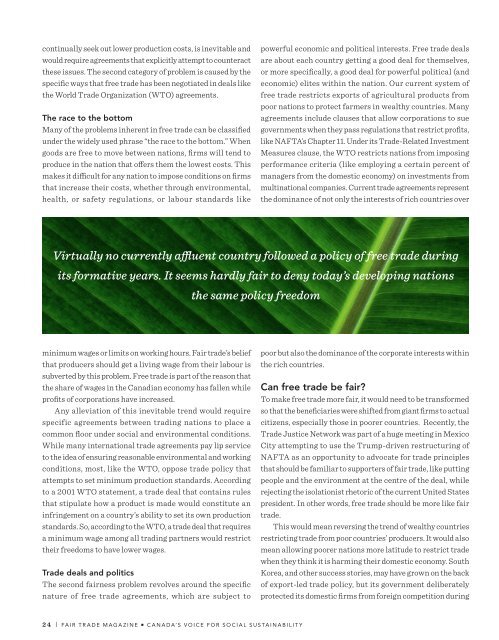FTM-July2017-Issuu
You also want an ePaper? Increase the reach of your titles
YUMPU automatically turns print PDFs into web optimized ePapers that Google loves.
continually seek out lower production costs, is inevitable and<br />
would require agreements that explicitly attempt to counteract<br />
these issues. The second category of problem is caused by the<br />
specific ways that free trade has been negotiated in deals like<br />
the World Trade Organization (WTO) agreements.<br />
The race to the bottom<br />
Many of the problems inherent in free trade can be classified<br />
under the widely used phrase “the race to the bottom.” When<br />
goods are free to move between nations, firms will tend to<br />
produce in the nation that offers them the lowest costs. This<br />
makes it difficult for any nation to impose conditions on firms<br />
that increase their costs, whether through environmental,<br />
health, or safety regulations, or labour standards like<br />
powerful economic and political interests. Free trade deals<br />
are about each country getting a good deal for themselves,<br />
or more specifically, a good deal for powerful political (and<br />
economic) elites within the nation. Our current system of<br />
free trade restricts exports of agricultural products from<br />
poor nations to protect farmers in wealthy countries. Many<br />
agreements include clauses that allow corporations to sue<br />
governments when they pass regulations that restrict profits,<br />
like NAFTA’s Chapter 11. Under its Trade-Related Investment<br />
Measures clause, the WTO restricts nations from imposing<br />
performance criteria (like employing a certain percent of<br />
managers from the domestic economy) on investments from<br />
multinational companies. Current trade agreements represent<br />
the dominance of not only the interests of rich countries over<br />
Virtually no currently affluent country followed a policy of free trade during<br />
its formative years. It seems hardly fair to deny today’s developing nations<br />
the same policy freedom<br />
minimum wages or limits on working hours. Fair trade’s belief<br />
that producers should get a living wage from their labour is<br />
subverted by this problem. Free trade is part of the reason that<br />
the share of wages in the Canadian economy has fallen while<br />
profits of corporations have increased.<br />
Any alleviation of this inevitable trend would require<br />
specific agreements between trading nations to place a<br />
common floor under social and environmental conditions.<br />
While many international trade agreements pay lip service<br />
to the idea of ensuring reasonable environmental and working<br />
conditions, most, like the WTO, oppose trade policy that<br />
attempts to set minimum production standards. According<br />
to a 2001 WTO statement, a trade deal that contains rules<br />
that stipulate how a product is made would constitute an<br />
infringement on a country’s ability to set its own production<br />
standards. So, according to the WTO, a trade deal that requires<br />
a minimum wage among all trading partners would restrict<br />
their freedoms to have lower wages.<br />
Trade deals and politics<br />
The second fairness problem revolves around the specific<br />
nature of free trade agreements, which are subject to<br />
poor but also the dominance of the corporate interests within<br />
the rich countries.<br />
Can free trade be fair?<br />
To make free trade more fair, it would need to be transformed<br />
so that the beneficiaries were shifted from giant firms to actual<br />
citizens, especially those in poorer countries. Recently, the<br />
Trade Justice Network was part of a huge meeting in Mexico<br />
City attempting to use the Trump-driven restructuring of<br />
NAFTA as an opportunity to advocate for trade principles<br />
that should be familiar to supporters of fair trade, like putting<br />
people and the environment at the centre of the deal, while<br />
rejecting the isolationist rhetoric of the current United States<br />
president. In other words, free trade should be more like fair<br />
trade.<br />
This would mean reversing the trend of wealthy countries<br />
restricting trade from poor countries’ producers. It would also<br />
mean allowing poorer nations more latitude to restrict trade<br />
when they think it is harming their domestic economy. South<br />
Korea, and other success stories, may have grown on the back<br />
of export-led trade policy, but its government deliberately<br />
protected its domestic firms from foreign competition during<br />
24 | FAIR TRADE MAGAZINE • CANADA’S VOICE FOR SOCIAL SUSTAINABILITY


